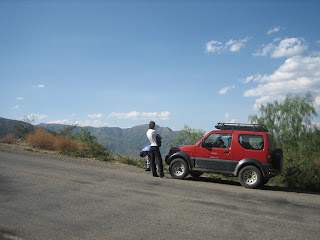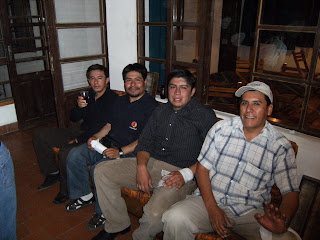The edit that seemed to put the icing on the cake for congress though, related to the clause outlining how many consecutive terms a president can be elected for. On the first draft it was up to three terms, but now it’s been brought back down to a maximum of 2 terms (5 years each)- a number that lets the opposition sleep at night.

Despite Bolivia’s breakthrough last week, on Friday the lovely Condoleezza announced that the United States has officially decided to remove Bolivia from the ATPDEA trade agreement because apparently the Morales government hasn't made a concerted effort to behave in whatever way it is that the United States wants it to behave. Meanwhile the United Nations, the Organization of American States and the European Union are all giving Bolivia major props for it's recent political accomplishment... It reminds me of that Sesame Street song/game ‘One of these things just doesn’t belong, one of these things is not like the other, lets-find-out…’ Remember? Then you had to choose which image on screen didn’t belong? For example: if you were left with three puppies and one rifle, you would pick the rifle as the oddball of the group and then Elmo would come on screen and confirm your genius status. Except I don’t think the producers of Sesame Street would ever sign off on the use of a rifle (they don’t even let Bert and Ernie live together anymore)… I just wanted to go overboard with some anti-American symbolism.
Usually bureaucratic, constitutional, legal mumbo jumbo stuff tends to bore me, but I’m intrigued by Bolivia’s recent triumph because I see it as an important foundation for change. The constitution, unlike most lengthy complicated legal documents, is straightforward and includes a bit of information on how some of the proposed changes will actually take place. This could make a huge difference. It’s one thing to state your objectives, but outlining how you’re actually going to get there is the harder part. This is an issue that I am confronted with a lot in the world of international development where people like talking about their good intentions, but have a harder time executing them. The United Nations Millennium Development Goals (MDGs- to be reached by 2015) are an example of this disconnect that I frequently wrestle with. As human beings I think we can all agree that the MDGs are all wonderfully, reasonable suggestions:
The thing I struggle with is that these are pretty enormous goals that don’t come attached to a very coherent or cooperative action plan. #8 is my favorite though because while every NGO on the planet is working towards these goals in their own way, I still don’t feel like we are really joining forces to ensure that this stuff happens. We need better teamwork. There is so much good stuff going on out there, but with better networking and knowledge sharing I think things could happen a lot faster.
When I find myself doubting the power and significance of the goals however, I have to remind myself that at least they exist as an indication of where we want to be, and at least we’ve finally agreed to make these issues a priority on an international level. As we all know, people, society and governments tend to be somewhat resistant to change, so even if all the MDG’s do is put the rusty gears in motion I guess I should recognize this is a very crucial first step.
Another somewhat bothersome example of the disconnect that I see in the field of international development, and more specifically the field of microfinance, relates to the word empowerment, which has become popularized in development literature by academics, NGO’s and policy makers. It is the idea of providing the necessary tools and knowledge one needs in order to liberate or….empower… themselves. The idea of helping people help themselves- a hand up not a hand out. This concept has taken development circles by storm, which is a definitely a good thing because it’s better than the concept that used to take development circles by storm- imperialism, but I worry that it’s just a new catch phrase like sustainability was a few years ago. I’m obviously all for the idea of teaching a man to fish, not just giving him one, but there needs to be more talk on how this is actually going happen. Talking about empowerment is fine and dandy, but actually make it happen is slightly more challenging because it basically it requires a total restructuring of societal and political norms.
Microfinance is said to empower women because it recognizes women as a priority group and institutions target women with their services. The only problem is that just ‘targeting’ women isn’t enough. Providing a new group of people with access to financial services that they were previously excluded from, doesn’t mean that now they’re now automatically empowered. In the case of women, sometimes accessing a microloan just adds to their responsibilities because now they're managing a small business and the loan to support it and their usual household duties. There is a whole pile of other factors that need to go along with the provision of financial services in order to make for a viable tool of empowerment. It’s a difficult concept to work towards too because there are no hardcore evaluation methods out there yet to indicate whether or not empowerment has been achieved- economic figures don’t work as empowerment stats as well. While financial independence may be a very important piece of the puzzle, if social and cultural norms don’t change, and especially if national and international policies don’t evolve along with the microfinance movement, then 'empowerment' efforts will only get so far.
I will conclude again by saying that I am happy that the conceptual framework on empowerment exists. It's great that these types of ideas and perspectives are circling around and maybe soon all the theoretical intentions will become a reality.
I’m by no means condemning the mission of microfinance. I think it’s a good way to start working towards a ‘bottom up’ approach to development; it just needs some tweaking here and there and some cooperation from all levels of society, not just the grassroots sectors.
That’s my beef for today. It was a lot and I don’t want be so jaded, but what would the point of me entering this field be if I had no opinions or criticisms to share?
I don’t have any personal photos this week because I went on a hike yesterday and threw my backpack (containing my camera) into a river. It was a pretty extreme hike and I was attempting to toss my backpack to the other side of some rocks because I thought my chances of making the jump would be higher without my pack. Unfortunately I forgot that I have no upper body strength and so I was unable to hurl my backpack to safety. I am letting my camera ‘dry out’ in hopes that this will magically solve the problem, but it’s not looking good. These photos are blatantly stolen from the net.



























